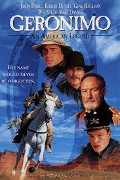
Directed by
Walter Hill
115 minutes
Rated M
Reviewed by
Bernard Hemingway

Geronimo (1993)
You’ve really got to wonder why this film was made. Perhaps someone thought that the success of Kevin Costner’s Dances With Wolves which had been a unexpected hit merely three years earlier could be replicated but aside from that, whilst being ruggedly picturesque and despite the title’s promise of epical proportions it is an unremarkable film, for all its post-Fordian sympathies, not far off representing probably the most famous Indian Chief of all time as a “Noble Savage”.
Wes Studi, who was a Cherokee (he made a career playing such roles, notably in Dances With Wolves and Michael Mann’s disastrous Last of the Mohicans in 1992) plays Geronimo whose story we pick up as he surrenders his people to the US Army in the form of Brig. Gen. George Crook (Gene Hackman). Shunted off to a small, non-arable reservation where his people are unable to survive as the farmers the “White-eye” want them to be Geronimo kicks back after his medicine man is murderer by the Army for inciting unrest. The film covers the war that followed and which lasted until Geronimo, exhausted, once again surrenders, marking the end of Native American resistance to White supremacy .
The potential here, personal and political, is great but Hill gives us long and familiar sequences of Indians and Whites riding their horse across stony empty landscapes and/or killing each other in close combat in skirmish after skirmish and not much else.
If Hill’s directing is not enough justify the film's existence most of the problems lay with the screenplay by John Milius and Larry Gross and the casting. The film badly wants in dramatic focus which, given its title should have been Geronimo but in fact Geronimo has no more than brief exchanges with anyone . His opposite number dramatically should have been Hackman’s Brigadier General but Hackman only appears in limited scenes at the beginning and end of the film and is largely there to state the justificatory “grand idea” of the US Army as a “protector” (my words) of the Indians. The next contender would have been Jason Patric’s Lt. Charles Gatewood who has been ordered to deliver Geronimo to Crook. However, despite their lengthy journey on horseback to the US Army fort and various subsequent encounters their relationship is not developed.
Instead, Milius and Gross rest the whole dramatic burden of the film on Matt Damon’s West Point rookie who observes and narrates the events depicted as a kind of Nick Carraway to Patric’s Jay Gatsby. The only exception to this is a grizzled army scout named Al Sieber (Robert Duvall) who enables the screenplay to confront the victor’s view of the morality of military conquest. Whilst Damon, in his first major screen role, is convincingly and suitably callow, Patric himself is far too anodyne to be remotely believable as a seasoned horse soldier.
Geronimo actually gives more time to the White captors (to be fair this was a studio decision) and more attention to getting to know and understand Geronimo might have made this more than a mildly satisfying picture-book history.
FYI: Although the end titles tell us that Geronimo lived another twenty years it doesn’t tell us that he later became a Christian, bought and farmed land, wrote his autobiography and became a living icon even riding in Theodore Roosevelt's inaugural parade.
Want something different?





